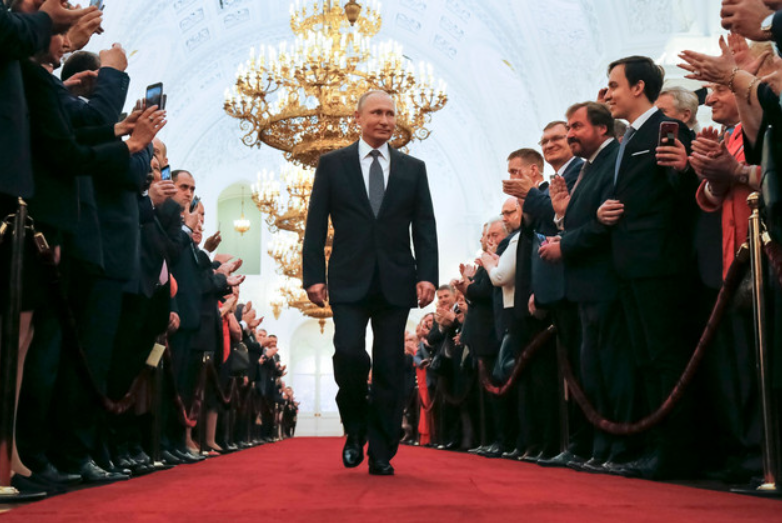(BBC News) He could probably have walked it blindfolded.
For the fifth time Vladimir Putin took the long walk through the Grand Kremlin Palace to the St Andrew’s Throne Hall. There, he took the oath of office and was sworn in as Russia’s president for a new six-year term.
“We are a united and great people. Together we will overcome all obstacles, we will bring all our plans to fruition, and together we will win,” President Putin told an audience of ministers and dignitaries.
The red carpet route may have been familiar to him. But much has changed since Putin’s first inauguration ceremony in May 2000.
Back then, Putin pledged to “preserve and develop democracy” and to “take care of Russia.”
Twenty-four years on, the Kremlin leader is waging war against Ukraine; a war in which Russia has suffered heavy losses. At home, instead of developing democracy, Putin has been curtailing it: jailing critics, removing all checks and balances on his power.”Putin thinks of himself now as Vladimir the Great, as a Russian tsar,” says Fiona Hill, a former White House national security advisor.
“If we took ourselves back to his first two presidential terms, I think we’d have a fairly favourable assessment of Putin. He stabilized the country politically and made it solvent again. The Russian economy and system were performing better than at any other previous time in its history.
“The war in Ukraine, going back to the annexation of Crimea 10 years ago, has dramatically changed that trajectory. He’s turned himself into an imperialist instead of a pragmatist.”
After nearly a quarter of a century running Russia, Putin has certainly made his mark. In the past, people rarely spoke of “Brezhnevism”, “Gorbachevism” or “Yeltsinism”.
But Putinism? That’s a thing.
“We have one more -ism in our history: Stalinism,” says Andrei Kolesnikov, senior fellow at the Carnegie Eurasia Russia Centre.
“I would say that Putinism is one more incarnation of Stalinism. He behaves like [former Soviet dictator] Stalin. His power is personalized like in Stalin’s time. He prefers to use a lot of political repressions. And, like Stalin, he is ready to keep himself in power until the physical end.”
The challenge, for the West, is how to deal with an increasingly authoritarian Russian leader determined to restore what he sees as Russia’s greatness; a modern-day tsar… with nuclear weapons.
“On the issue of nuclear weapons, there’s an awful lot that we can do,” says Hill. “Some countries, like China, India, Japan, have been extraordinarily nervous when Putin has engaged in nuclear sabre-rattling in Ukraine and have pushed back against that. We can enforce restraint on Russia by creating an international framework for pushing back on this wild and speculative talk about using nuclear weapons.
“Perhaps that is something of a model for how we can deal with Vladimir Putin, who in many respects is something of a rogue leader. We need to create a more constraining environment, less permissive for the kinds of actions that he wants to undertake.”
Officially, Putin won more than 87% of the vote in the March presidential election. However, he had faced no serious challenger in a contest widely seen as neither free nor fair.


